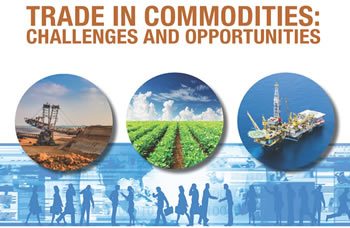The spectacular fall in prices for oil and other commodities since mid-2014 and what it means for resource-rich developing countries will be among key issues discussed by participants of UNCTAD's sixth annual Global Commodities Forum at the Palais des Nations in Geneva on 13–14 April.
 |
From recent highs of approximately 100 dollars per barrel in June 2014, oil prices dropped precipitously to less than 50 dollars in early 2015, which is also a 40 per cent drop from the 10-year average of just over 80 dollars. The government budgets of oil-producing developing countries are particularly vulnerable to such price movements.
For example, at the height of the supercycle, the governments of Angola, Nigeria and Chad drew 70 per cent or more of their revenues from their oil sector. Revenues plunged as prices dropped, forcing these governments to slash spending, freeze construction of new projects and delay the payment of civil servants' salaries.
Among the sessions at the Forum will be a debate on the prospects for renewable energy sources in a lower-carbon energy mix, given the recent fall in oil prices.
In addition to the fall in oil prices, movements among other commodity prices have been generally down by 10 to 50 per cent from their 10-year averages. For example, in early 2015, iron ore prices were down 50 per cent and rubber prices down 37 per cent from their 10-year averages.
These price trends are of particular concern to commodity-dependent developing countries, which rely heavily on the income from their commodity exports.
More generally, lower prices squeeze the income available for distribution throughout the value chain. This can create tension among stakeholders and undermine policies enacted during the supercycle of high commodity prices.
Two keynote speakers will outline the key issues for debate throughout the Forum. Philippe Chalmin, President of the Cyclope market analysis service and a professor at Dauphine University in Paris, will identify some of the key forces behind the recent mutations on markets, with a view to understanding how they will impact stakeholders.
Yilmaz Akyuz will deliver a second keynote address. A former director at UNCTAD, Mr. Akyuz is the Chief Economist at the South Centre and he will share his ongoing research on governments' macroeconomic management of the recent commodity boom cycle. Although many commodity exporting countries enjoyed sustained growth during the period, their policies had limited success in converting this growth into, for example: a diversification of their economies, a deepening of their capital markets or a reduction in their indebtedness.
In view of the recent fall in the oil price, a debate on the prospects for renewable energy sources in a lower-carbon energy mix will be among the sessions that follow the keynote speeches. The session seeks to emphasize that government policies are important in establishing investment incentives, such as fiscal concessions, to promote renewable energy technologies. In parallel, budget constraints due to lower oil prices may represent an opportunity for governments to reduce or eliminate their consumption subsidies for petroleum products.
The plenary themes to be considered through panel discussions and open debates over the two-day event are:
Prospects for transparency-themed governance reform in the Swiss commodity trading sector
Policy space for resource-rich developing countries in the trade of raw materials
New dynamics in international agricultural commodity trade policies
The prospects for renewables in a lower-carbon energy mix
End of the supercycle? Implications for development and terms of trade
The 2015 Global Commodities Forum: "Trade in commodities: Challenges and opportunities" will open with addresses by UNCTAD Secretary-General Mukhisa Kituyi and UNCTAD Trade and Development Board President Ana Maria Menéndez Pérez of Spain.


